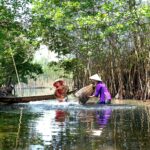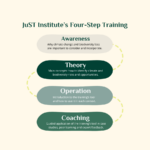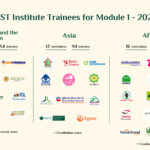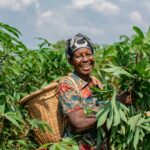
JuST Institute Trainings: Learn About Our First Cycle!
With the support of BNP Paribas, Global Environmental Facility (GEF), the International Fund for Agricultural Development (IFAD), the Grameen Credit Agricole Microfinance Foundation, FS Impact Finance, last year JuST Institute launched the first cycle of “Climate, Biodiversity, Inclusive finance Trainings for IFSPs – Module 1: Smallholders – Agriculture & Livestock”.
We are happy to share that our first batch of trainees – 398 employees of 44 Inclusive Finance Service Providers (IFSPs)* from 28 countries across Latin America and the Caribbean, Africa, and Asia – are on track to finish their training by June/July of this year! This first training cycle starts a journey for capacity building to enable the path to resilient sustainability financing for smallholder farmers around the three regions. This is part of JuST Institute’s products that aim to catalyze market development towards climate and biodiversity positive finance.
In this article we explain why we believe capacity building of the inclusive finance sector on climate and biodiversity risks and opportunities is important, what our Module 1 Training consists of and how it can be useful to the participants’ daily activities. We will also include information on how our partnerships are enhancing our work and our next projects.

Problems we are tackling
Tackling the climate change and biodiversity loss crises in an inclusive manner is at the heart of the just transition. While smallholders around the world are some of the most vulnerable populations to climate change and biodiversity loss, they have insufficient access to capacity, affordable financing for sustainable practices and technologies, and market access. This prevents their participation in the environmental transition, and adaptation to climate change. If they had access to implement better practices and technologies in their daily operations, there would be significant associated benefits in terms of increased resilience, sustainability, food security, productivity, and improved livelihoods.
“We jointly realized that there was a huge gap for financing climate resilience and biodiversity conservation for small scale producers & rural communities, and all economically vulnerable entrepreneurs. Existing public or private funds are not enough and do not reach them”.
Alain Lévy – Head of Inclusive Finance for Americas and Asia, BNP Paribas
Not only do smallholders face a financing gap, but there is also a knowledge gap coming from the Inclusive Financial Service Providers (IFSPs) that provide them financial services for their productive activities. As IFSPs assess and manage financial and social risks and opportunities, they should integrate climate and biodiversity in their portfolio. The insufficient awareness, expertise, and capacity to assess and manage these issues exposes smallholder farmers and IFSPs to higher financial and social risks, hampering them to grab opportunities related to climate change adaptation/mitigation, biodiversity conservation and a just transition.
This reduced awareness and needs for further capacity should be tackled through a global approach, targeting the most vulnerable ones and strategic regions to face climate change and biodiversity loss.
“We strongly believe that we need to have a global approach to face the issues of climate change & biodiversity loss. We need to be able to get information about the best practices. Through the JuST Institute we can learn from what is happening around the world and acquire new knowledge to support our partners”.
Philippe Guichandut – Secretary General, Grameen Crédit Agricole Microfinance Foundation

What are the JuST Institute Trainings?
To address the mentioned barriers of insufficient awareness and capacity, JuST Institute develops and provides trainings and capacity buildings. They are organized per scope, level and methodology. In Q3 2023 we launched the first module, namely: the “Climate, Biodiversity, and Inclusive finance training – Module 1: Smallholders – Agriculture & Livestock. Level: Basic”.
Through this first training, we accompany loan officers and managers of IFSPs to acquire expertise and skills to include climate and biodiversity risks & opportunities into their daily activities & decisions. We provide learning experiences with experts and ongoing support to scale up, maintain, and enhance their capacities.
Methodology: How do we do our training?
Within our approach, we introduce participants to concrete tools developed by various key stakeholders in climate change adaption and biodiversity conservation finance. We accompany participants in a step-by-step approach, supporting them to include climate and biodiversity assessment within their risks management and financing through the actual use of such tools on their target clients and portfolio.
We deliver our training in four steps that lead us to our main goal: IFSPs trainees being able to use in their operations and transmit within their institutions the concepts and tools seen in our classes.

Two key aspects of our collective training are:
- Peer learning. By bringing together IFSPs from different countries, levels of expertise, and activities in climate and biodiversity, we create the possibility to learn from each other’s practices.
- Learning by doing. By providing access to practical and operation tools, participants experiment the concepts in practice, solving the case studies and applying the concepts to their own activities and target market. With the support of experts, participants strengthen their capacity to assess and manage sustainability risks. This will later boost their work towards more sustainable and climate positive investments!
Framework and Theory:
The training is developed in line with JuST Institute’s framework for risk and opportunity management at the nexus of climate, biodiversity, and inclusion. This framework was created to provide participating institutions with a pathway towards a gradual and inclusive transformation of their activities in pursuit of a finance and economy-wide transition towards net-zero, nature-positive, resilient, and inclusive societies.
Our approach aligns with the latest climate and biodiversity standards and methodologies for financial institutions – EU Taxonomy, TNFD, TCFD, among others – and is tailored to the context of inclusive finance building on proven methodologies like the UNEP Microfinance for Ecosystem-based Adaptation. The training aims to make theoretical concepts of climate change and biodiversity loss risks & opportunities operationalizable in the context of IFSPs through introducing to the participants a range of tools, such as:

Outputs and Benefits:
The JuST Institute Training expects to forge three main outputs in our trainees’ experience, consisting in the enhancement of their:
- Understanding of their smallholder clients’ vulnerability to climate change and biodiversity loss, as well as their impacts on ecosystems.
- Understanding of how to assess and manage their clients’ vulnerability and impact in their daily operations, with a range of practical tools.
- Understanding of the multiple benefits of incorporating climate and biodiversity dimensions in their financial and non-financial products and their risk management processes.
The training aims to deliver to the participating IFSPs knowledge in action and practical tools and methodologies to use in their daily activities, at the level of credit assessment and portfolio management.
« The JuST Institute trainings will help us in the environmental transition, and they will allow reinforcing the capacities of the financial institutions and providers of technical services on the continent. Therefore, they will develop more adapted and innovating products. »
– Davy Serge Azakpame, Regional Technical Specialist at International Fund for Agricultural Development (IFAD).
Tailor-made Experience for Field Officers and Managers:
The training offers a tailor-made experience for field officers and managers. Field officers are instructed in how to identify & start to manage climate and biodiversity impacts and vulnerabilities of smallholder farmers and rural communities; how to verify practices (e.g. Nature based Solutions) and green technologies financed; their climate, biodiversity and inclusion-related impacts, and the resiliency generated.
For managers, the training brings a better opportunity to learn how to assess and start to manage climate and biodiversity risks and opportunities at portfolio level; how to use adapted indicators and adopt monitoring and reporting processes at both client and portfolio level.
About our partners:
We are glad to have among our partners key players in agricultural, environmental transition and financial industries, who have been supporting the launching of our training and with whom we are working on related financial products. Our partnerships have enabled us to start a transformation movement towards nature positive inclusive finance for smallholder farmers in Latin America and the Caribbean, Africa and Asia. They have also helped us connect with their microfinancing, agriculture and banks networks, creating a stronger movement to mainstream biodiversity and climate adaptation financing around the globe.

“We share a common objective: financial inclusion and access to capital for small holder farmers and small-scale producers, to transition to climate resilient, low-emission and nature-positive practices”.
Jason Spensley – Senior Climate Change Specialist at the Global Environment Facility (GEF)
Our Trainees:
The first cycle of training for our first module includes the participation of 44 IFSPs in 28 countries and 398 trainees distributed between Latin America and the Caribbean, Africa, and Asia. We are proud to have such a great participation and engagement. We thanks all participating IFSPs for their work towards integrating climate and biodiversity finance capacity into their activities. These are some of the institutions we are working with:


What’s next?
This is only the beginning! After finishing our current cycle of training, we will launch the next cycle, as well as advanced trainings for IFSPs that want to professionalize in climate and biodiversity finance. This marks another step in our mission to catalyze market development towards climate and biodiversity positive finance. We believe training and capacity building should be provided on an ongoing basis to support the sector’s path toward adaptation. We are excited to continue this global transformation of financing smallholder agriculture, leveraging their potentiality and knowledge and enabling a just transition.
“We are excited to cooperate with the JuST Institute because we believe in the urgency and importance of biodiversity conservation and the financing of a Just Transition”.
Luca Soppelsa – Prokurist and Head of Risk Management at FS Impact Finance (FSIF)
Are you interested in being part of the change, participate to our trainings, or offer such trainings to your partners?
Contact us at contact@justinstitute.org and let us know about your institution!
And don’t forget to keep up with our upcoming projects for a more just and sustainable world!
* Inclusive Financial Services Providers (IFSPs) is a term that encompasses a diverse range of entities such as Micro Finance Institutions (MFIs), Fintechs, local SME banks and cooperatives, among others. These specialize in financing smallholders and micro, small and medium-sized enterprises (MSMEs).